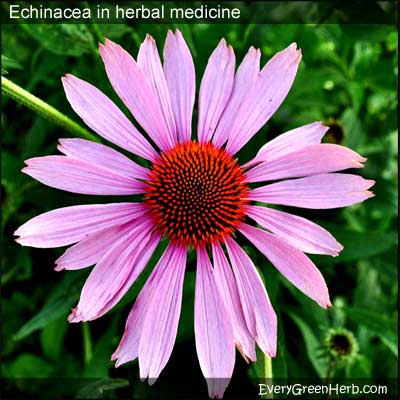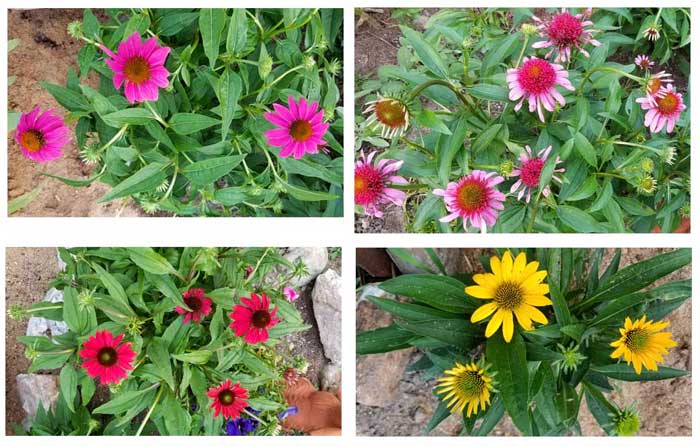Echinacea in herbal medicine
Echinacea and immunity

Echinacea (Echinacea purpurea, Echinacea angustifolia, Echinacea pallida) builds immunity while naturally protecting against colds and flu. Scientific tests have shown that echinacea increases the production of white blood cells. It also increases the body's production of interferon which helps fight virus.
Echinacea should only be taken for six to eight weeks at a time. Stop for two or three weeks and then begin again if needed. Echinacea is one of the best immune builders in herbal medicine.
As a medicinal herb, echinacea strengthens the body's resistance and helps fight infection caused by bacteria, fungus, and virus. It also is considered a lymphatic tonic.

Use echinacea in home remedies.
- When using the herb as a wash for external applications, apply to affected area frequently.
- Dried echinacea can be used as a dusting powder on boils and eczema.
- The root is known to help kidney infections.
- Diluted echinacea tincture makes a good gargle for all throat problems, especially sore throats.
- Echinacea tea can be used for colds, flu, fever blisters, gingivitis, yeast infection, and food poisoning.
Use echinacea with elder flower or catnip to treat congestion.
If treating any condition with mucus, phlegm, or congestion, combine echinacea with catnip or elder flower.
When using echinacea to get over the flu, use with fever reducing herbs like yarrow or white willow bark.
Scientific studies
Trials show that echinacea reduces the chance of getting a cold in healthy individuals.
Leaves, flowers, and roots are used in dry form and in extracts to protect against germs in cold and flu seasons.
Echinacea extracts are rich in glycoproteins and polysarccharides. These substances stimulate immunity by activating macrophages and natural killer cells. Besides anti-viral activity, echinacea is also anti-inflammatory.
Recent research suggests that outcomes of preventive treatments may depend on the types and amounts of bacteria within the plants themselves. The makeup of the soil may also be a factor.
A long history
Native Americans were familiar with echinacea and have used it for centuries. Among other things, they used it for snakebite, fever, and to treat old, stubborn wounds.

Echinacea in the garden
Echinacea or Purple Cone Flower is a well-known plant. It is valued for producing beautiful blooms in the flower garden.
Echinacea is easy to grow in any dry, sunny location. It is draught resistant and Likes a well drained soil. Echinacea hates to get wet feet.
Echinacea is native to North America and is considered a wildflower. It grows abundantly in the great plains and does well here in the North Georgia mountains during dryer years.
Butterflies and bees love the knee-high plant.
Echinacea makes a beautiful cut flower that is long lasting. Many varieties are available in garden centers and some have a sweet scent. Echinacea blooms the first year from seed if planted early.
It is easy to prepare echinacea for winter storage. Just harvest after the plant flowers, brush off any dust, tear into pieces, and dry in an airy location. Store in air tight containers away from insects, light, and heat.
You can use the pink petals for tincture, leaving behind the brown head with ripening seeds for reproduction. The root is the most potent, but digging it kills the mother plant.
*High doses of echinacea can cause nausea and dizziness. Consult with a physician before taking echinacea if you have an autoimmune disease such as TB, lupus, collagen disease, or multiple sclerosis.
Sometimes people that are allergic to daisies, mums, asters, or ragweed may experience a reaction to echinacea. Always consult with a healthcare professional before using any herbal remedy especially if pregnant, nursing, or taking other medications.
Sources:
https://www.ncbi.nlm.nih.gov/pmc/articles/PMC4068831/
https://www.nccih.nih.gov/health/echinacea
Blessings to you and yours!
Thanks so much for reading my blog. Jan.

*Note - the information on this website has not been evaluated by the Food and Drug Administration.
© 2005-2024 website design and content by Janice Boling